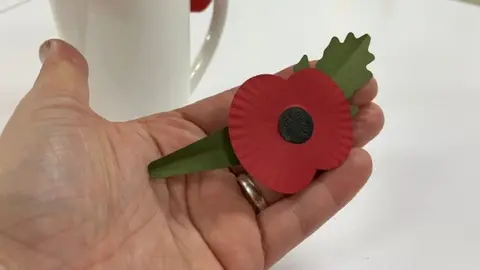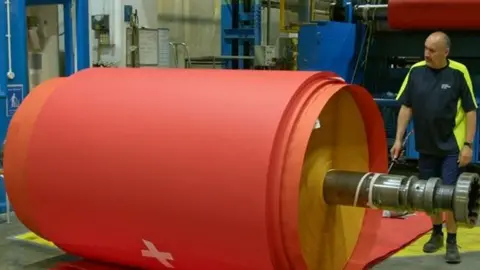Royal British Legion poppies ditch plastic for paper
 BBC
BBCThe Royal British Legion has made this year's remembrance poppies plastic free with the help of three miles (4.8km) of Cumbrian paper.
The James Cropper factory near Kendal has been supplying material for the annual fundraising event for 45 years.
But for 2023, the green stem and black centre of the iconic poppy design uses paper partially recycled from coffee cups, allowing the removal of plastic.
Funds from poppy sales are used to help serving and former service personnel.
Company managing director Richard Bracewell said the workforce felt "immensely proud" to supply the Royal British Legion.
He said: "We worked with a design agency to come up with the final design.
"We had to make the green stem from a slightly stiffer, slightly heavier weight of paper which means it retains its shape when it is put in a button hole."

The paper has been made from blend of renewable fibres, 50% of which coming from used coffee cups.
Mr Bracewell said: "Research shows we have 40% less carbon emissions by getting rid of the plastic and we've used 40% recycled paper to make this as well."
The poppy was first introduced as symbol of remembrance at the end of the First World War.
The company was approached by the Royal British Legion to produce paper for poppies in 1978. Previously they had been made from fabric.
Back then the request was considered "ahead of its time" as the Legion wanted the symbol of remembrance to be easily recycled.
 James Cropper
James CropperGary Ryan from the Royal British Legion said: "We're proud to have designed a plastic-free poppy that will enable people to show their support for our Armed Forces community in a more sustainable way.
"We are thankful to our long-standing supplier James Cropper who developed the innovative paper used in the new poppy."

Follow BBC North East & Cumbria on Facebook, X (formerly Twitter), and Instagram. Send your story ideas to [email protected].
